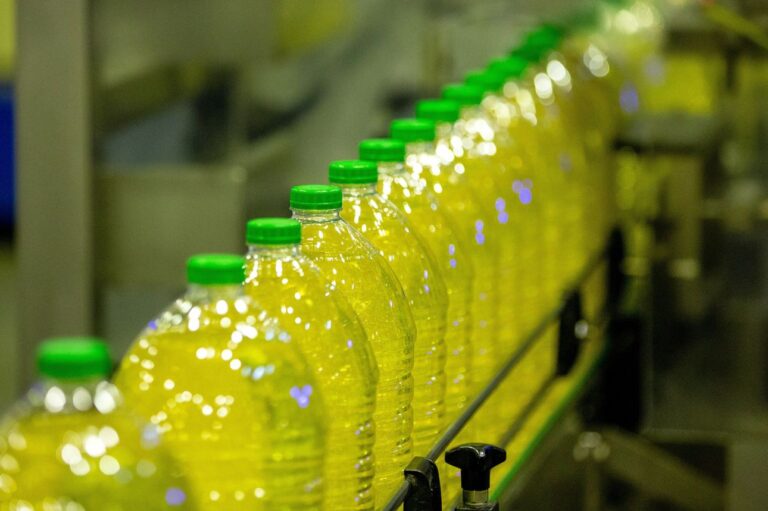
Photographer: Andrey Rudakov/Bloomberg
Even if Russian troops were to immediately pull out of Ukraine, the world’s biggest exporter of sunflower oil, supply of the commodity is expected to be disrupted by the war well into the future, and households and businesses are already feeling the pinch.
Amid a backdrop of rising prices, stores in some countries are already limiting how much of the oil people can buy due to shortage fears.
“I came on purpose to the store just to buy this bottle of oil because prices are sky-rocketing,” Enriqueta Cruz told The Wall Street Journal, after buying a 5-liter bottle of sunflower oil at a Mercadona supermarket in Valencia, the maximum allowed per customer. She said she paid 12.40 euros ($13.68) for a bottle that cost less than 8 euros ($8.83) a few weeks ago. Mercadona declined to comment.
Other Spanish supermarkets such as Consum and Caprabo have also imposed a limit on the sunflower oil each customer can buy per day.
“Limitations in the quantity that each customer can buy are just a preventive measure in response to the unusual behavior of consumers, in order to avoid shortages,” a spokeswoman from the Spanish Association of Distributors, Self-Services and Supermarkets (Asedas) told the Journal. According to Asedas, per capita sunflower consumption in Spain is 4 liters a year.
Sunflowers, beyond being Ukraine’s floral emblem and a symbol of solidarity with its people since Russia’s invasion began, link the country to the world economy and Europe’s dinner tables. In 2020, Ukraine was the world’s biggest exporter of seed oils, with $5.3 billion in exports, according to the Observatory of Economic Complexity. The European Union imported crude sunflower seed oil worth 1.46 billion euros ($1.61 billion) from Ukraine in 2021, Eurostat data shows.
Available stocks in the EU would last between four and six weeks, European vegetable oil and protein meal industry association Fediol said earlier this month.
“Beyond that period, it is likely that lack of availability of crude sunflower seed oil and limited alternatives will lead to a shortfall of refined/bottled sunflower seed oil on the European market, and that this will be felt up to the consumer level,” the association said.
In Germany, very high demand for some of supermarket chain Lidl’s products, including cooking oils and canned goods, has led the store to restrict sales of the items, a spokeswoman said. She declined to comment on whether Lidl was increasing prices of the oils.
In Italy, stocks of sunflower oil are expected to run out in a month, according to Assitol, the country’s oil-industry association.
“From the beginning of the conflict to today, at least 50,000 tons of crude sunflower oil have remained in Ukrainian ports and have never arrived in Italy. If war ended in the next few days, coming back to normal would still be very difficult,” president of the group’s seeds oil division, Carlo Tampieri said.
“The market immediately reacted to the shortage of oil, and sunflower oil prices immediately rose by 70%,” he said. The group is trying to find alternatives, “but it’s not easy,” he said.
The seeds oil sector was already seeing difficulties due to the coronavirus pandemic. “Now it is quite impossible to foresee the future,” Mr. Tampieri said.
Along with households, restaurants and bakeries and other food-industry businesses are also feeling the impact of the war in Ukraine through sunflower oil supplies.
The owner of Barcelona restaurant Leche de Tigre, Alexis Mastrokalos, said the price of a 25-liter bottle of sunflower oil jumped 75% from Feb. 26 to March 9. “We had to quickly change our menu,” Mr. Mastrokalos said, explaining that he and his business partner, Jose Manuel von Bischoffshause, have stopped making dishes that reduce the re-frying quality of the oil, to extend the life of their sunflower oil.
Mr. Mastrokalos said many restaurants have panicked and are hoarding sunflower oil, which further increases prices and could lead to shortages but his establishment is experimenting with substitutes, such as pomace oil. Pomace oil isn’t considered olive oil because it isn’t made from the fruit, but is chemically extracted from the pulp, skin and pit after they have first been first used to make virgin olive oil.
Supply risks are not limited to sunflower oil, Caroline Bain, chief commodities economist at Capital Economics, said, as Russia and Ukraine together account for 80% of the world’s sunflower-oil exports, but also 30% of world wheat exports.
“Exports have ground to a halt as a result of the war. We will have very high prices for these goods even if we don’t see shortages,” Ms. Bain told the Journal.
Wayne Gordon, commodities strategist at UBS Global Wealth Management, said the agricultural cycle has been disrupted beyond the short term.
Sunflower oil is harvested and produced in the summer and autumn. By this time of the year, Ukraine would have already exported 70% of the annual exports from 2021’s harvest, Mr. Gordon told the Journal.
“The real risk is that Ukrainian farmers can’t plant their crops,” Mr. Gordon said. Ukrainians should be now preparing crops to plant in May and June, but war has upended their plans.
Access to fertilizer is the other key issue for Mr. Gordon, as 50% of the world’s fertilizer is produced in Russia and Belarus, and he expects a sharp increase in its cost and shortages, extending supply concerns far beyond a single crop such as sunflowers.
“Even if farmers could plant, there would be bad yields due to problems with fertilizers,” he said.
Write to Maria Martinez at maria.martinez@wsj.com and Kim Richters at kim.richters@wsj.com
